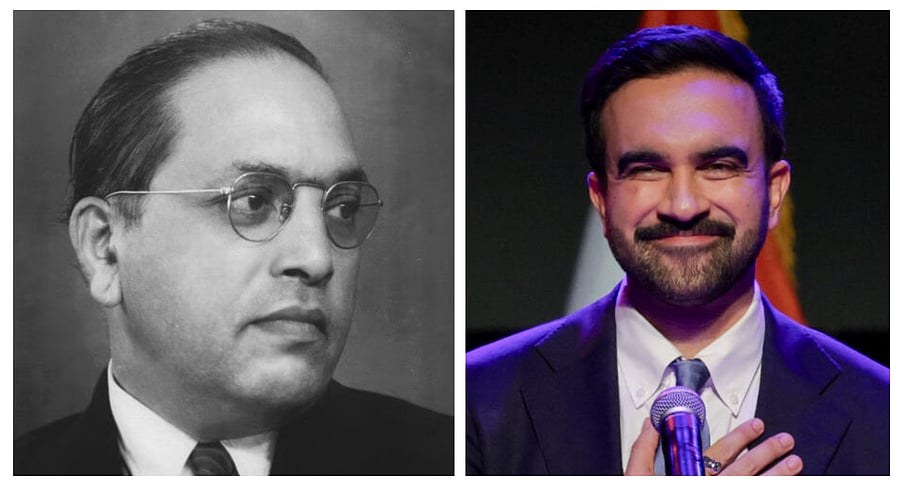
B R Ambedkar and Zohran Mamdani
Credit: Wikimedia Commons and Reuters
Zohran Mamdani, the Democratic New York City mayor-elect, has become a global sensation in the political landscape. His forthright ideological critique of capitalism in a country often perceived as the citadel of capitalist ideology, and known for its foundational economic doctrine of liberal free market, has caused a stir in the United States’ politics.
His campaign gained traction in a very short span of time, largely due to his criticism of the pro-rich Donald Trump administration and the welfarist demands he puts across, which included freezing rent rates, providing free bus passes, universal child healthcare, labour rights of the working class, and so on.
Since his election to the New York State Assembly in 2021, Mamdani has championed democratic socialism, questioning the traditional American dream rooted in competition, profit-driven ambition, individualism, and private control over production and capital. He received global appreciation for his issue-based stance opposing deportation, anti-immigration policies, and Islamophobia at a time when Right-wing populist tendencies and anti-immigration protests are surging across the Western world.
Mamdani has received flak from India-American Hindu groups for co-sponsoring, earlier this year, the New York Assembly Bill 6920, which prohibits discrimination based on a person's caste in opportunities of employment, housing, and access to public accommodations. The Bill supports Dalits in the US who are the receiving end of caste discrimination among the Indian diaspora.
The most striking feature of Mamdani’s appearance in US politics is the ideological debate, sparked by his candidacy. In stark contrast to the US’ established capitalist economic moorings, Mamdani champions democratic socialism, a political and economic ideology that endorses the abolition of capitalism, the establishment of a democratically run and decentralised socialist economy. His views are not only at loggerheads with capitalism, but also with many other ideological streams, including those that attempt to reform or mitigate the flaws within capitalist structures.
In the US, advocates of democratic socialism, like Bernie Sanders, have received mass support in the past as well, especially after the 2007-2009 Great Recession. What makes Mamdani’s candidacy notable is the unprecedented public support, which is indicative of a growing sentiment among people for change from the entrenched structures of exploitation, inequality, unaffordability, and deprivation, perpetuated by the capitalist system.
Democratic socialism is a major point of political discourse in India. During the drafting of the Constitution, B R Ambedkar stressed on social democracy, which included economic equality, social justice, gender equality, political freedom, constitutional rights, fair democratic processes, individual dignity, and self-respect. Today, his ideas are much more significant than ever, as India faces growing inequality, crony capitalism, and threats to constitutional processes.
In the initial decades post-Independence, the Congress supported State intervention with Central planning. However, the Nehruvian model and the mixed economy started to decline in the 1960s with severe foreign exchange crises, which ultimately culminated in the 1990s neoliberal reforms.
In today’s India, marked by rising privatisation and dwindling public investment, the need for a new development model that ensures basic goods and prioritises the well-being of the most marginalised is more urgent than ever. Mamdani echoes similar reformist calls.
What shall be the economic model that suits India’s social, cultural, political, and economic circumstances? One can take a cue from Ambedkar’s idea of social democracy. Rather than replicating Western models, he reimagined social democracy through the prism of deep-rooted intersectional challenges of caste, class, and gender. A key dimension of his approach was the integration of social democracy with social justice, transcending the binaries of socialism and capitalism.
Ambedkar moved beyond the confines of liberal democracy and formal equality to emphasise substantive equality, where the State actively addresses social inequalities. He advocated a form of social democracy rooted in political equality, social reform, economic justice, democratic political institutions, and constitutional morality. Ambedkar’s approach was distinctly different from Western democratic socialism; he adapted it to India’s social realities.
Rehnamol Raveendran is associate professor, Jindal Global University, Sonipat. X: @Rehna_AntiCaste.
(Disclaimer: The views expressed above are the author's own. They do not necessarily reflect the views of DH.)